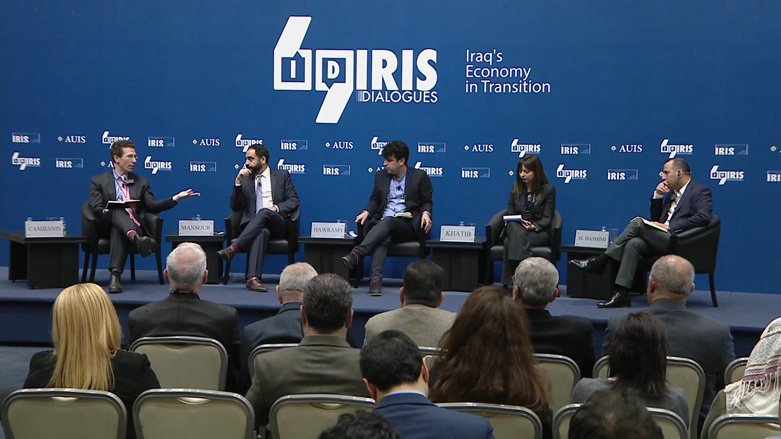Experts encourage private sector in ‘Iraq’s Economy in Transition’ AUIS forum in Sulaimani

SULAIMANI, Kurdistan Region (Kurdistan 24) – Experts on Sunday discussed challenges the economy of the Kurdistan Region and Iraq will face in the post-Islamic State (IS) era, highlighting ideas that can help the country’s economy to recover from years of turmoil.
The forum, sponsored by Kurdistan 24, was held by Institute of Regional and International Studies (IRIS) at the American University of Iraq – Sulaimani, with many officials, researchers, and journalists in attendance.
The topic was split in four different panels: It Pays to Fight: Moving Beyond the War Economy; What will it take for the Private Sector to Participate? Delivering on Kuwait; Iraq’s Local Economies: Growth and Integration; and An Economic Path Forward for Iraq & the KRG.
“There is no doubt that Iraq has an extremely compelling story because of its resources and potential. But investors need to see a map toward achieving that potential,” Alia Moubayed, Director for Geo-economics and Strategy at the International Institute for Strategic Studies (IISS) said.
Moubayed, as a panelist in the forum, stated that there is a real need to promote competition in Iraq.
“Iraq is located in a region which goes through continuous changes. Iraq today will have to compete with every one of its neighbors, with Saudi Arabia, the UAE, and Lebanon, among other countries, to attract capital,” she said.
Rasmi al-Jabri, Deputy Chairman of the Iraqi British Business Council, mentioned that the public sector in the country has to change its attitudes toward the private sector.
“The public sector considers the private sector a competitor,” Jabri added, explaining that the public and private sectors need to work together to develop Iraq’s economy.
Other panelists also argued the Iraqi public sector is a weak player in developing the economy, urging a privatization process to develop economic growth.
“State-owned companies are fairly weak. We need to privatize them, or bring in foreign entities to strengthen them, to ultimately lead to economic growth,” Ahmed Tabaqchali, CEO of Asia Frontier Capital (AFC) Iraq Fund, said.
The economies of the semi-autonomous Kurdistan Region and Iraq has been suffering over the past few years from financial and political crises, especially after the rise of the Islamic State (IS) in the country in mid-2014, and the sharp drop in global oil prices.
In mid-February 2018, the International Conference for the Reconstruction of Iraq was held in Kuwait to raise funds do Iraq and bring foreign investors to invest in the country as part of its rebuilding efforts.
As a result of the conference, Iraq received pledges of $30 billion from its allies, mostly in credit and loans, but fell short of the $88 billion Baghdad claimed it needs to recover from its three-year long war.
Editing by Nadia Riva
